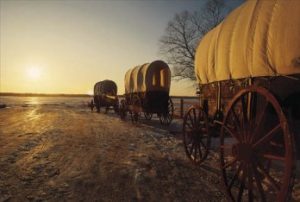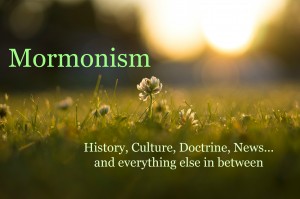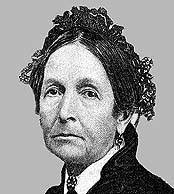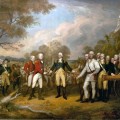I was once asked to create an English as a Second Language program at church, to be carried out under the literacy program run by the official auxiliary for Mormon women. Eventually, our advanced class morphed into a citizenship preparation class. One question on the citizenship test involves the National Anthem. Since I can’t sing at all, a friend offered to teach the class the song. I taught its history and then she taught them the words, the tune, and the meaning of the anthem.
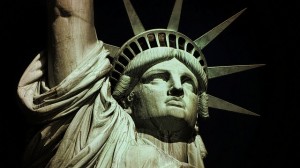 I stood off to the side to watch and listen as they stood to sing it all the way through for the first time. Within moments, the students had tears streaming down their faces as they sang. As I listened to the most powerful version of that song I’d ever heard, I wondered when I’d last even given thought to what that song meant. When had it last brought tears to my eyes?
I stood off to the side to watch and listen as they stood to sing it all the way through for the first time. Within moments, the students had tears streaming down their faces as they sang. As I listened to the most powerful version of that song I’d ever heard, I wondered when I’d last even given thought to what that song meant. When had it last brought tears to my eyes?
I had already come to realize the immigrants I knew were far more patriotic than I was, more truly patriotic than most Americans were. Everything was so exciting, so special, so amazing to them. They loved everything about their chosen homeland and I enjoyed helping the ones who came to my class learn more. The immigrants I knew didn’t think it counted as patriotism to spend their lives complaining about everything in the country they didn’t agree with and not seeing the good. They knew that democracy meant they wouldn’t always get their way. Some came from places where they had no say in how things worked. They were just grateful they now lived in a place where they would someday be allowed to vote and make a difference, more than they already were. I didn’t see them making the mistakes so many born-in-the-country Americans made, the idea that America can only be great when the person they supported for president won, when their personal lives were going well, or when they liked the most recent political decisions. They were patriots every day. Democracy was a great thing. If it wasn’t perfect today, there would be opportunities to work for change because that was what democracy was all about.
Patriotism is a Commandment
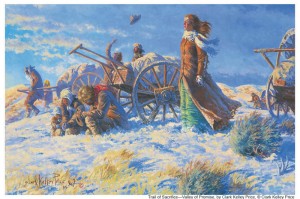 For Mormons, patriotism is considered a commandment. We are taught to honor our nation, wherever we live, and to show respect to our leaders. Students of Mormon history might be surprised to know that this patriotism was often carried out in the midst of terrible abuse by the nation they loved and honored. Things didn’t have to be perfect, their party didn’t have to be in charge, and their lives didn’t have to be problem-free for them to be patriotic.
For Mormons, patriotism is considered a commandment. We are taught to honor our nation, wherever we live, and to show respect to our leaders. Students of Mormon history might be surprised to know that this patriotism was often carried out in the midst of terrible abuse by the nation they loved and honored. Things didn’t have to be perfect, their party didn’t have to be in charge, and their lives didn’t have to be problem-free for them to be patriotic.
One of my favorite stories illustrating this point took place in pioneer Utah. The Mormons had settled that area because their own country had forced them out of the United States and into Mexico-owned Utah. They had, in their various communities, been robbed, beaten, tarred and feathered, and killed. Even children had died at the hands of religious persecutors. The governor of Missouri issued an extermination order against them and the president of the United States told them, “Your cause is just, but I can do nothing for you.”
They moved from place to place and eventually headed for Utah under the leadership of Brigham Young. During the journey, the very country that had forced them to leave caught up with the pioneers and asked for men to volunteer to serve in the military of a country that had not wanted them. Brigham Young encouraged them to accept the request, and many did.
Patriotism Against the Odds
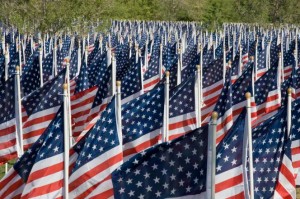 Now, they were finally in Utah and wanted nothing more than to be left alone to practice their religion in peace. As the 24th of July, celebrated as Pioneer Day among the Mormons, approached in 1849, the Mormons prepared to celebrate the anniversary of their arrival in Utah. Despite everything their country had done to them, they chose patriotism as the theme of their celebration. They put up a 104-foot flagpole and created a 65-foot long American flag. Brigham Young led a procession of high-ranking Church officials to Temple Square in Salt Lake City and they were followed by twenty-four young men, each carrying copies of the Declaration of Independence and the Constitution—the very same documents that had failed to protect them from violations of freedom of religion because the fourteenth amendment did not yet exist.
Now, they were finally in Utah and wanted nothing more than to be left alone to practice their religion in peace. As the 24th of July, celebrated as Pioneer Day among the Mormons, approached in 1849, the Mormons prepared to celebrate the anniversary of their arrival in Utah. Despite everything their country had done to them, they chose patriotism as the theme of their celebration. They put up a 104-foot flagpole and created a 65-foot long American flag. Brigham Young led a procession of high-ranking Church officials to Temple Square in Salt Lake City and they were followed by twenty-four young men, each carrying copies of the Declaration of Independence and the Constitution—the very same documents that had failed to protect them from violations of freedom of religion because the fourteenth amendment did not yet exist.
The crowd listened as one of the young men read the documents to them, not so they could jeer or mock them, but so they could show their respect for these documents and the country that had produced them. A group of senior citizens, known as the Senior Sires, were next. One of them, Phineas Richards, gave a patriotic address in which he said:
Brethren and friends, we who have lived to three-score years, have beheld the government of the United States in its glory, and know that the outrageous cruelties we have suffered proceeded from a corrupted and degenerate administration, while the pure principles of our boasted Constitution remain unchanged. …
“… As we have inherited the spirit of liberty and the fire of patriotism from our fathers, so let them descend [unchanged] to our posterity.”
These people, a symbol of the reason we need the First Amendment and must fight with courage to protect it, understood something much of the world does not. The founding of the United States and portions of the Constitution exist because God put forth His hand and made it happen. He set up this country to be a place where freedom of religion would allow the coming forth of His gospel. No matter how we might feel about the specific details of our government and our country at any specific time, we still honor it. We celebrate the sacrifices made on our behalf. When we see problems, we don’t whine—we pray, we vote, we write our congressmen, but we stay proud of the heritage that made it possible for us to do all three of those things. If the Mormon pioneers could do it, having faced so much more from their nation than we ever will, we have no real excuse not to do the same.
Independence Day may be over for another year, but we can celebrate our divine heritage every day, and we should. Happy Independence Year.
Below: Boyd K. Packer tells the story described above and helps us to understand the role of patriotism in Mormon theology.
http://youtu.be/OeQgpiqIpqc
About Terrie Lynn Bittner
The late Terrie Lynn Bittner—beloved wife, mother, grandmother, and friend—was the author of two homeschooling books and numerous articles, including several that appeared in Latter-day Saint magazines. She became a member of the Church at the age of 17 and began sharing her faith online in 1992.

